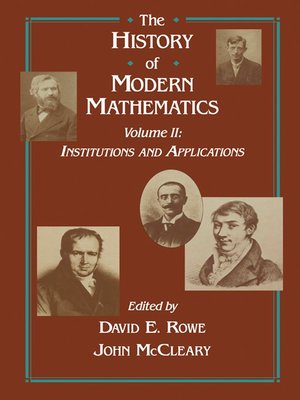Institutions and Applications
ebook ∣ Proceedings of the Symposium on the History of Modern Mathematics, Vassar College, Poughkeepsie, New York, June 20-24, 1989
By David E. Rowe

Sign up to save your library
With an OverDrive account, you can save your favorite libraries for at-a-glance information about availability. Find out more about OverDrive accounts.
Find this title in Libby, the library reading app by OverDrive.



Search for a digital library with this title
Title found at these libraries:
| Loading... |
The History of Modern Mathematics, Volume II: Institutions and Applications focuses on the history and progress of methodologies, techniques, principles, and approaches involved in modern mathematics. The selection first elaborates on crystallographic symmetry concepts and group theory, case of potential theory and electrodynamics, and geometrization of analytical mechanics. Discussions focus on differential geometry and least action, intrinsic differential geometry, physically-motivated research in potential theory, introduction of potentials in electrodynamics, and group theory and crystallography in the mid-19th century. The text then elaborates on Schouten, Levi-Civita, and emergence of tensor calculus, modes and manners of applied mathematics, and pure and applied mathematics in divergent institutional settings in Germany. Topics include function of mathematics within technical colleges, evolvement of the notion of applied mathematics, rise of technical colleges, and an engineering approach to mechanics. The publication examines the transformation of numerical analysis by the computer; mathematics at the Berlin Technische Hochschule/Technische Universität; and contribution of mathematical societies to promoting applications of mathematics in Germany. The selection is a valuable reference for mathematicians and researchers interested in the history of modern mathematics. Mathematical institutions in France and Germany and their role in promoting applications Relationship between mathematics and physics Foundations of mathematics Complex variable theory, geometry and topology Geometry in the spirit of Klein's Erlangen program Algebra and number theory Formative influences on mathematics in the United States






